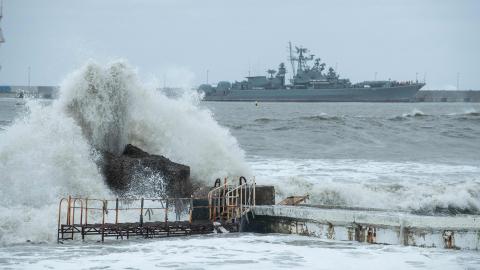Ukraine continues to rack up successes against Russian military assets in the Black Sea region. The list of sunk or damaged ships near occupied Crimea and in Novorossiysk is growing ever longer by the day.
In recent weeks, Kyiv has hit Russian rail ferry assets on both sides of the Kerch Strait, a tugboat, the Tsyklon corvette, the Kovrovets minesweeper, and the Kommuna salvage ship in Sevastopol, as well as the Dzhankoi airfield and multiple other locations in occupied Crimea and Novorossiysk. An estimated one-third of the Black Sea Fleet (BSF) is now sunk or damaged.
Kyiv has Moscow on the defensive in the maritime domain, where its assets are increasingly vulnerable. The BSF no longer operates in some areas of the Black Sea. The grain corridor is currently operating well, with exports nearing pre-2022 levels. These developments have led to the narrative that Kyiv is “winning the battle of the Black Sea.”
These successes challenge the narrative that a Russian victory is inevitable. The battlespace is dynamic, and Ukraine can inflict significant damage on superior Russian forces through ingenuity and the right kind of foreign support, particularly long-range U.S., UK, and French missiles.
These successes, while strategically significant, will not return the Black Sea Region (BSR) to the status quo ante before 2014. Russia remains entrenched in occupied Crimea and is strong and formidable in the land domain, where it continues to press forward—albeit slowly and at a considerable cost. Moscow also controls the air, although it will begin to face Ukrainians flying F-16s in the coming months. The war will be won or lost on land and in the air—not at sea.
Russia’s renewed focus on the Kharkiv sector has diverted Ukrainian assets to the north, increasing the possibility of a breakthrough in the south, where Putin seeks to control the northern Black Sea littoral and take Odessa. Moscow’s growing influence over Georgia also reflects its determination to consolidate control over the eastern Black Sea littoral.
But Russia has increasingly militarized Crimea since 2014, so it remains a Russian stronghold even if its assets there are at a greater risk of Ukrainian strikes. Its A2/AD (anti-access/area denial) assets regularly interdict most of the missiles that Ukraine sends its way, even if some get through. Russia regularly uses Crimea as a launchpad to target other parts of Ukraine. Its large store of cruise and other missiles can reach across the BSR and beyond. There is enough Russian firepower there, in Novorossiysk, and elsewhere to remain a strategic factor that complicates the calculations of any actor in the broader BSR.
The Black Sea contains an unknown number of naval mines, anchored and drifting, estimated in the hundreds. These perils will affect maritime traffic for years. The Kremlin is diversifying its ground lines of communication from mainland Russia to Crimea in the event that Ukraine successfully takes out the Kerch Bridge.
Moscow continues to control large parts of the Ukrainian exclusive economic zone (EEZ) and abuts the Romanian EEZ, negatively affecting Ukraine’s strategic calculus. Russia may no longer be declaring “exclusion zones” for military exercises, which, since 2017, have regularly closed off large areas of the Black Sea for weeks and months, but international aviation and ship traffic give much of the Black Sea a wide berth. Russia uses electronic warfare against littoral states, for example, jamming GPS signals that interfere with Romanian and Bulgarian air and sea traffic.
Putin has taken his obsession with the Russkiy Mir and Novorossiya, the historical name for the southern regions of the Russian Empire to the north of the Black Sea, to unprecedented levels. He sees the BSR in zero-sum terms: Russia must control it and deny it to others. It is nearly viewed as a domestic body of water, analogous to one of the American Great Lakes.
Russian control of Crimea needs to be broken because it is critical to ensure that Ukraine survives as a sovereign state within its internationally recognized borders. As long as Moscow occupies Crimea, it will continue to use it as a launchpad to pummel Ukraine, squeeze its economy, and complicate its access to international markets. These realities also represent a serious long-term threat to the entire BSR, home to three NATO member states and three EU candidate countries.
Ukraine and the BSR will remain a contested space as long as Russia controls Crimea and until Russia is defeated, accepts the status quo ante before 2014, or the sides reach another mutually acceptable agreement. Putin will challenge the interests of the littoral states and NATO for as long as he is able to do so. He has benefited as successive U.S. administrations, NATO, and the EU have not paid close attention or responded in a sustained manner to the many warning signs from Russia in the last twenty years. This signaled to Putin that the region was of peripheral interest to the United States and Europe. Like all dictators, he responds to weakness and capitalizes upon inattention.
Moscow has been more aggressive in the BSR and has more directly confronted Western interests there than elsewhere in Europe. A consolidation of Russian control over the Ukrainian littoral would leave Moscow in possession of highly strategic territory that it can be expected to weaponize. It would keep the region militarized and make future conflict more likely.
Retention of Crimea would simplify Moscow’s expanding its malign influence over the BSR, the Caucasus, Southeastern Europe, the Western Balkans, the Levant, and the broader Middle East, as well as the Eastern Mediterranean region and beyond. If Russia were to end the war on its terms, the vast energy resources of the Black Sea would be less likely to be developed, to the detriment of European energy security. The Black Sea must, once again, be a free and open zone for peaceful international use.
The BSR today is a nodal point, bridge, and transit route between North and South, as well as East and West, with the growth of the Middle Corridor and critical infrastructure like East-West oil and gas pipelines or fiber optic cables, and trade in resources like coal, metals, and cotton. With Beijing also expanding its footprint in the Middle Corridor, its objective of pushing back U.S. and Western influence in the BSR is clear. It is not in the U.S. national interest to continue to cede influence to the aggressive, revisionist powers of Eurasia.
This would have negative consequences for the most acute long-term threat the United States faces—the Chinese Communist Party (CCP), whose leaders are watching closely for signs of U.S. and allied resolve, social cohesion, and military strengths and weaknesses. CCP leaders cannot be allowed to conclude, based on the United States’ behavior and failure to demonstrate strength on the matter of Ukraine, that the United States lacks the resolve to oppose their efforts to shape an alternative world order.
Iran and its proxies will gain confidence to destabilize the Middle East further. Pyongyang will feel more empowered to act out on the Korean Peninsula. Dictators, autocrats, and indecisive leaders worldwide will adapt to these new realities.
The United States also has a major interest in the preservation of the post-Cold War security order, which has benefitted millions of Americans and the U.S. economy—the United States' prosperity is inextricably linked with the stability and security of Europe. Putin’s brazen violation of the rules-based international order cannot stand; internationally recognized borders are inviolable, state territory is sovereign, independent countries cannot be extinguished, and their choice of futures is theirs alone.
Russia cannot be permitted to trample on international law and norms. Its invasion of Ukraine violated the 1945 UN Charter, the 1975 Helsinki Accords, the 1991 Belovezha Accords, the 1994 Budapest Memorandum, the 1997 Black Sea Fleet Treaty, the 1998 Russia–Ukraine Friendship, the 2003 Russia-Ukraine Treaty on the use of the Sea of Azov and the Kerch Strait, and the 2010 Kharkiv Pact, not to mention the laws of war and international humanitarian law. Russia has also not recognized the 2009 International Court of Justice ruling over the southern EEZ of Snake Island.
The whole-of-government U.S. Black Sea Strategy, which the December 2023 National Defense Authorization Act tasked the administration with completing in 2024, needs to be more ambitious than what State Department Assistant Secretary for European and Eurasian Affairs James O’Brien presented to Congress in October 2023. That demonstrated an understanding of what is at stake in the BSR and stressed that the fate of the region is inextricably linked to that of Ukraine and wider Europe—but it was heavy on the description of well-known problems, came with few additional resources, and provided no clear roadmap for implementation.
With the Kremlin confirming in its March 2023 Foreign Policy Concept and secret annex— stating that it is fighting the West and seeks to change the global order—the United States must continue to prioritize countering Russian actions where they most affect U.S. interests, even as it recognizes Communist China is the more serious long-term threat.

















